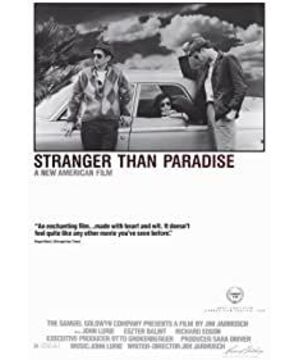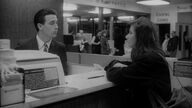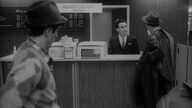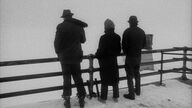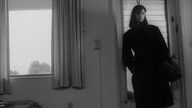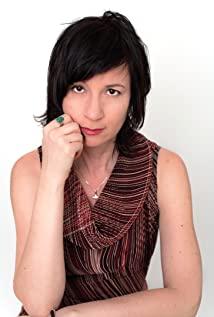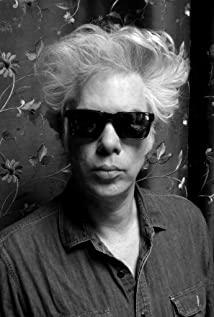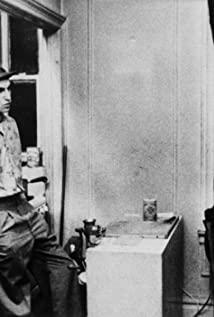He is like the vampire played by Higgins, a lonely and depressed underground musician. He came from the Middle Ages and used mobile phones and TVs weirdly. He desperately wanted to be independent from the crowd, but he had to rely on popularity to maintain his life.
If you like Wes Anderson's movies, then you probably like Jarmusch too. The former pursues the meticulousness of every frame and is known as a symmetrical madman approaching perfection, while the latter strives for perfection in the overall structure of the film. This delicate structure is clean, complete, and simple, and at the same time, it has a strong sense of substitution . When you watch the last scene, listen to the ending song, and then relive the design of the whole movie, it is difficult not to be impressed by the ingenuity of Jiamusu. move.
01
Jarmusch's films are so well-received that some people joked that even his lowest-rated film could premiere at the Cannes Film Festival, and the most praised of them was his first film "A Stranger in Paradise" that was released in theaters. .
In this low-budget film, the young Jarmusch fully displayed his ambition and played the structure to the extreme. It is like a well-arranged novel. It is divided into three volumes according to the different situations of the protagonist. Each volume is subdivided into several long and short chapters. The chapters are connected by a two-second black screen. It came to an abrupt end just in time. If you drop the whole film on the ground, you'll find that it just breaks into whole chunks without a single extra crumb. There are no near and far shots, no transitions, cuts between shots, or even editing. "Stranger Things in Paradise" is like a drama staged in a movie theater. The shots are always placed near and far, waiting for them again and again. The protagonist appears, and the curtain ends again and again. Then in these cool and restrained sole perspectives, the imperceptible sense of alienation in life can emerge violently.
Jarmusch loves to photograph street scenes. When the protagonist is walking on the road or sitting in the car, the camera often faces the street on his side. The huge graffiti, slogans, street lamps, and abandoned marble classical buildings are cold and quiet in the night. This is the absurdity of the real world, and it is also a reality like a dream.
[I like the feeling of finding a way out after being lost in the city. This process has allowed me to see many wonderful things. Have you been to Morocco? There, the old and new worlds look at each other, but they are not separated by the bay, they are a mixture. Once, I saw two girls standing in front of the cell phone store, both very good looking girls in their twenties, wearing miniskirts and boots or something. And not far behind them, at the end of the alley; then at the same moment, I saw two guys in medieval clothes butchering sheep with wooden awls - these two things appear in this same picture. , and each happens. It feels so cool. 】
From his small-budget debut in 1980 to the premiere of "The Dead Don't Die" at Cannes in 2019, Lao Jia's ambition to play with movies has never died, and his constant exploration of structure and movement has made each of his films unique. With a distinctly personal style.
At the beginning of "Stranger Things in Paradise", in the strong and desolate rock jazz, with a long lens shift, the audience followed Ava, who had just arrived in New York, to gradually see a strong and depressing New York mixed with old and new.
With the psychedelic rock of "Love Forever", the completely top-down shot turns into a live vinyl in a dizzying constant rotation.
In "Outlaws", the three prisoners were excited and panicked after escaping from prison, and the camera followed across the lake, exposing the three to various wonders of nature.
"Earth Night" uses five clocks that show the corresponding time of different cities as the entry point for the stories that take place in each city at the same moment.
His structural treatment is mostly open and close: "Mystery Train" finally merges three parallel stories into one. "Outlaws" places the three protagonists in different backgrounds. When the three lines briefly converge on the same cell, they soon go their separate ways, again following different trajectories with the protagonists.
Patterson's hero Paterson is a bus driver with a mechanical timetable, and the film goes to great lengths to shoot from Monday to weekend, mirroring Pat with astonishingly detailed consistency. A repetition of Terson himself.
At the beginning of each day, director Xu Haofeng called this kind of "discreet" film that does not develop in three stages as "string beads" . Each scene is independent and parallel, like pearls strung together.
It is completely different from the progressive structure of traditional storytelling. This anti-climax treatment does not follow the rules of Hollywood production at all, but it allows us to feel the thinking and transformation made by Jarmusch in the changing times.
[The problem with Hollywood studios is that they are timid, they are afraid of any work that cannot evaluate its market performance. In such a Hollywood studio system, any innovation is a miracle. 】
Jarmusch's independence is self-contained, but not static. You will feel that compared to when he was young, his films are looser in structure, with more details and more obvious plot direction. This is an inevitable result of the fragmentation and complexity of the entire era. It is a balance between caring for the audience and insisting on self. It is also the estrangement from the public's emotions that he himself needs to bear as the "Godfather of American Independent Film" and as a film poet. .
02
Alienation is a common theme in all Jarmusch's films.
This sense of alienation is often defined at the very beginning of the film, whether it is his usual jazz rock, the strange shooting angle at the opening, the cool tone throughout, the absurd ending of the story, or the emotional design of the characters' identities , Jarmusch always makes the protagonist out of the background, revealing indescribable weirdness.
Just like the protagonists of "Only Love Forever" are two vampires who have been wandering in the world for hundreds of years and still cannot integrate into human life, just like the protagonists of "Outlaws" are three fugitives, two seem to have bad tempers , The scheming person was framed by others, and the simple optimist was the real murderer.
In addition to the protagonist, Jarmusch also downplayed the background of the story, removed passers-by in the street scene, blurred the boundary between reality and fantasy, and thoroughly emphasized the isolation of the protagonist. Minimalism" .
Patterson, the protagonist of the movie "Patterson", never uses a smartphone. He wakes up at six o'clock in the morning, kisses his wife next to him, walks to work, sits in front of the steering wheel and writes poetry, and listens to the daily complaints of his colleagues. , straightening the crooked mailbox at the door of the house after get off work, having an unappetizing dinner with his wife, going out to walk the dog, drinking a beer at the same bar, and so on. Jarmusch has photographed this eternal reincarnation life over and over again, so that we can deeply remember this dullness, so as to imagine Patterson's boring ten years.
However, it is such a person who regards writing poetry as a lifelong career. The bus driver and poetry, the regular rhythm of life and the poet's sensitivity to life make Patterson a normal abnormality.
At the beginning of the movie, the wife told Patterson that she had a dream about "twins" , so Patterson often encountered twins in his life. The repetition of such grotesque imagery is always favored by Jarmusch. For example, in "Broken Flower", he repeatedly used pink to reflect the inner world of the protagonist.
Likewise, the twins mirror Patterson's contradictions in identity. Maybe you have had a similar experience. When you hear a new word by chance, you can find it again and again by chance in the following life. Especially as a poet, Patterson is used to make him pay more attention to external stimuli. In order to constantly encounter such small probability events.
These little designs are further exacerbating his own abnormality.
But contradictions and anomalies are not the ultimate goal of Jarmusch. On the contrary, Jarmusch makes these contradictions get along well, in order to confirm a truth: bus drivers can also write poetry. Patterson's work and poetry are almost seamless, interrupting and being interrupted, but he's used to it. He never thought that writing poetry was more noble than driving a bus, nor did he think that writing poetry requires escaping from the world to be admired by others. Yang Shiyang has a very good comment:
[What makes this story so pleasing is the poet's introspection. He does not look up to poetry, nor does he look down on life. 】
03
When he was young, Jarmusch made no secret of his rebelliousness. He wrote poems, started bands, and cursed at those "big-budget money-burning movies" and sponsors. He joked that he was a cultural bitch, playing with poetry, music and movies. He is a cultural craftsman who roams underground in New York.
[My ambition is to create, and to interpret it in my own way. 】
Many people think his films are dull because life itself is like that, and Jarmusch is just persistently collaging the silhouettes of our individual lives.
Filmed in 1984's "Stranger Things in Paradise", the ending is that three young people meet for a vacation together, but they are on different sides. In 1986's "Outlaws", the two people endure hardships and finally come to a fork in the road and choose one of them. Wave goodbye.
Jarmusch made them meet and meet again for a short time, but in the end they were destined to embark on their own different paths, because this absurdity is dominated by cold and alienation, and fighting alone in life is the beginning of everyone. , and their end.
After the film aired, French right-wing newspapers criticized:
[French intellectuals' affirmation of Jim Jarmusch is like a deaf and stupid parent applauding his stupid child. Jarmusch is 33 years old, the same age when Christ was crucified. We can only hope that his film career will be reborn like Christ. 】
The comment was cut out by the rebellious Jarmusch and carried around in his purse.
Old Jia, who has entered old age, is still covered with sharp independent fighting horns. The subject of vampires in the film market was already flooded during the filming of "Only Love Forever".
[But the more they ask for something, the more I take something out, which is the opposite. They began to divest accordingly. But only by doing so can I keep the work sane. So in the end, this is not a vampire movie anymore, but a romance movie with vampires in it. 】
But at the same time, he had to find a way to live in underground movies. Lao Jia recognized Wong Kar Wai's artistry. He mentioned in the interview that the market in mainland China is huge, and Wong Kar Wai's movies are very popular there. As a unique landscape of Chinese post-modern directors, Wong Kar-wai was influenced a lot by Jia Muxu. He also downplayed the story and chose to be a dream maker to create dreams in movies. It's a pity that the fate of fighters is so similar in every age. Ten years later, the classics of Wong Kar-wai have gradually disappeared, and they are offered to a group of literary and artistic youths to pay their respects.
[The cinema of the future will only enlarge the production of money-burning movies. As for the future of underground cinema, I know very little, and I am a little frustrated and a little hopeful. My fate is also unpredictable, and now I can't even afford my own office. 】
This is the helplessness of Jiamusu and the helplessness of the times. He is like the vampire played by Higgins, a lonely and depressed underground musician who came from the Middle Ages, using mobile phones and TVs weirdly, desperately trying to be independent from the crowd, but had to rely on popularity to maintain his life.
Tarkovsky likens filmmaking to carving time, but time also carves these craftsmen.
Like Almodóvar, there is a flash of tenderness in his most recent works: Patterson finally gets a sudden revelation and, like a god, picks up his pen and writes poetry again. The vampires Adam and Ava have cuddled each other through the long years, wearing loose pajamas in psychedelic rock, barefoot on the carpet, hugging and dancing, and the end of the film is in the darkness of night, and the intoxicating requiem from the tavern Qu allows these two old souls to live.
The tones of the film are still cool and bright, and a sense of alienation pervades the seemingly harmonious picture, giving the film a layer of romantic poetry.
Wong Kar-Wai also used these elements in "Breakthrough". Tony Leung and Leslie Cheung swayed slowly to the music in the living room, and I don't know how many spectators were drunk.
Putting perspective into life itself is one of the transformations of Jiamusu's later works. He put aside the absurd endings he used to abruptly stop earlier, and turned to hope, new life, and epiphany.
I really liked the images of Patterson reading the poems, the lines gracefully lined up on the dark beat of the drums, at this moment the gears of life stopped, as if the whole world was listening carefully.
This is not deviating from life. I would like to regard them as a continuation of life, and also a requiem played by director, poet and musician Jarmus for the bygone era.
end
Film review▏Book review▏Irregular
Welcome to follow and forward
View more about Stranger Than Paradise reviews


